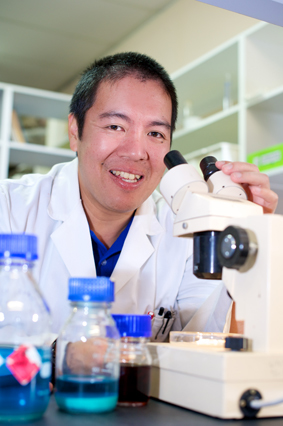Synthetic plastics to prevent bacterial biofilms

Southern Cross University (SCU) researcher Dr Lachlan Yee is investigating how to develop synthetic plastic surfaces that continuously generate nitric oxide to deter the formation of bacterial biofilms. The project — a collaboration with chemicals manufacturer Chemson Pacific — is one of three SCU initiatives which this week received funding through the Australian Research Council (ARC) Linkage scheme.
Plastic surfaces exposed to aqueous environments rapidly become covered by a film of bacteria, which can cause infection. Dr Yee said these bacteria communicate in a number of ways, using chemicals like nitric oxide to communicate to the mature bacteria colony when it is time to leave a surface and recolonise new surfaces.
“We’ve developed a way to combine plastics and clever sustainable chemistry to tell bacteria to leave this surface alone,” he said.
“Our plastics send nitric oxide signals in a sustainable way in order to remove established bacteria or repel bacteria trying to settle in order to keep plastic surfaces bacteria-free. Furthermore, repelled bacteria are susceptible to current antibiotic and antimicrobial technology.”
Current research has developed plastics that continuously generate nitric oxide, which breaks up existing bacterial biofilms, but not for extended periods of time. This project’s approach is significant because it avoids bacterial resistance to the nitric oxide treatment.
“We feel the technology is simple enough to include into almost any manufactured polymer surface,” Dr Yee said. “The early application gains we would like to target include flexible plastic surface needing to be kept bacteria-free … We have had interest from drinking water distributors, food preparation firms and water filtration customers.”
SCU’s other successful Linkage projects are as follows:
- Professor Bradley Eyre will lead research to understand and quantify the factors controlling the emission of carbon dioxide, methane and nitrous oxide from estuaries. The findings will have direct implications to the management, rehabilitation and protection of waterways (including biodiversity) in Australia.
- Dr Sally Robinson will lead a project to improve the rights and wellbeing of young people with cognitive disability by exploring their relationship and interaction with paid support workers. The project expects to deliver new understanding and improved practice around how paid support relationships can foster mutual care, respect and value at a critically important time in young people’s lives.
Microplastics found to alter the human gut microbiome
Microplastic-treated cultures showed a consistent and significant increase in acidity (lower pH...
Sustainable, self-repairing, antimicrobial polymers developed
From medicine to electronics and optics, new materials developed by scientists at Kaunas...
A better way to create conductive polymers
New research disproves the longstanding belief that to create conductive polymers, substances...





